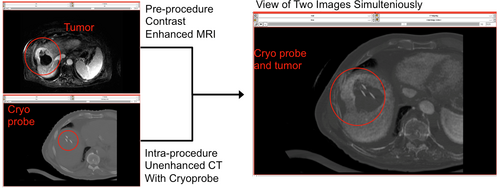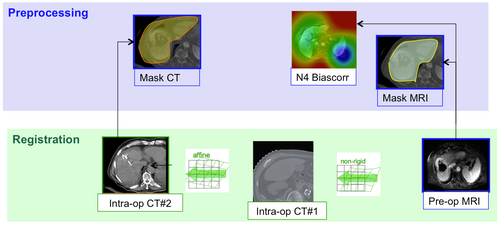Non-rigid MR-CT Image Registration
From NAMIC Wiki
Home < Non-rigid MR-CT Image Registration
Contents
Non-rigid MR-CT Image Registration Tutorial
Overview
This tutorial demonstrates how to perform a pre-operated contrast enhanced MR image to intra-procedure CT image non-rigid registration. The case study is CT-guided liver tumor cryoablation.
Clinical significants
- Non-rigid registrations desirable to compensate for liver deformation caused by patient positioning, respiratory motion, and interventional manipulation.
- A multi-modality non-rigid registration method can enhance visualization of tumor margins and location during the planning, targeting, and monitoring phases of CT imaging-guided cryoablation procedure.
Tutorial Topics / Targets
- Slicer Modules Used:
- N41ITKBiasField Correction
- Editor
- BRAINSFitIGT Registration
- Image Processing Tasks Performed:
- Intensity non-uniformly correction
- Mask generation / segmentation
- Inter-modality non-rigid image registration
- Image Data Used:
- Pre-operative abdominal MR with surface coil, showing liver
- Planning and Intra-operative CT with cryo-probe
Overview
- This tutorial will go through the following steps (in order):
- Preprocessing
- MRI mask generation
- CT mask generation
- MRI Bias Field Intensity Correction
- Registration
- MRI-CT(#1) non-rigid registration
- CT(#1)-CT(#2) affine registration
- Resampling & Fusion
Tutorials
Non-rigid MR-CT Image Registration Tutorial [ppt] [pdf]
Tutorial materials
Material data:
People
Atsushi Yamada, Ph.D. (Research Associate, Brigham and Women's Hospital and Harvard Medical School)
Dominik S. Meier, Ph.D. (Assistant Professor, Brigham and Women's Hospital and Harvard Medical School)
Nobuhiko Hata, Ph.D. (Associate Professor, Brigham and Women's Hospital and Harvard Medical School)

